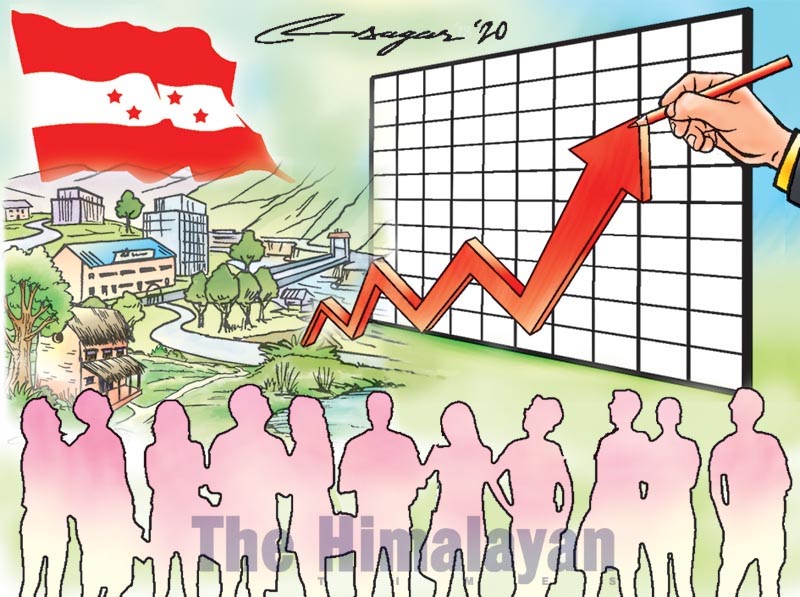Memoir of a technocrat: Villages were focus of reforms
The money that was sent to the villages in the 1990s very likely eventually ended up creating village elites, who now pose a serious threat to the integrity of our election system
When the Nepali Congress (NC) first came to power in 1951, it inherited a feudal country. Its focus was on the farmers toiling under the heavyweight of an exploitative state. The NC at the time followed a simple formula of statecraft: help farmers, be austere, aim to produce efficient manpower to be able to spend money on development works, establish institutions such as the Central Bureau of Statistics and Office of Auditor General to effectively plan and monitor state expenses, and implement progressive taxation.
In 1960, King Mahendra took a misstep of rolling back the democratic process and started a partyless Panchayat system of governance. By 1990, with almost no growth, no development, mounting debt, and a series of adventurous foreign policy missteps, the Panchayat system became too untenable to survive, and the NC was back in power.
Ram Sharan Mahat then guided the country from the brink of indebtedness and fiscal chaos, first as vice chairman of the National Planning Commission and later as finance minister. Mahat’s new book, “Trials, Tremors, and Hope: Political Economy of Contemporary Nepal” details the Nepali economy’s journey since 1990, with some meanderings to include the peace process.
Mahat’s views are relevant even now because Nepal’s chronic problems in the last seven decades have been similar. We do not have skilled manpower and undershoot our development expenditure targets. Our long-term and short-term plans are generally deeply flawed, and projects face both cost and time overruns. And the jobless youth threaten political stability.
The NC adopted democratic socialism as its guiding tenet in 1956. Unfortunately, king Mahendra and the communists also espoused socialism as their principle. That NC’s socialism is not the dominance of state-owned firms became clear during the eighth five-year plan, though this would continue to beleaguer Mahat later.
In the 1980s, the state-owned enterprises - many were established by the Russian and Chinese governments - were bleeding. In 1990, for example, the cumulative loss of state-owned firms was about 8 per cent of the total revenue of the government. There were no jobs for youths as the government was not private-sector friendly. Privatisation of these bleeding firms was a natural choice. As it happens in politics, accusation of underselling these firms followed. And ideologues in the party wondered whether privatisation of these firms was consistent with the principle of socialism espoused by the party.
Mahat, in his book, answers the ideologues by arguing that BP Koirala, the charismatic founder of the NC, would have approved his reforms. To late Koirala, socialism meant equality in political and economic fronts. While a representative system in which leaders are elected through periodic fair elections with universal suffrage would provide political equality, an economic system that enables liberation from exploitation, poverty and injustice would provide economic equality. Koirala believed abundant production must precede distribution and that the economy’s productive capacity must be enhanced.
Economic liberalisation in the 1990s consisted of many significant initiatives. The license raj in starting industries and importing goods was abolished. Exports were facilitated, telecommunication and financial sectors were opened up for private investment, bureaucracy was made lean, customs processes were simplified and computerised, and the private sector was welcomed in the health and education sectors. Until the Maoist war and the palace massacre plunged Nepal into political uncertainty, this seemed to have worked.
Nepal recorded the best decadal growth rate in history, revenue mobilisation started becoming better, export to import ratio steadily increased, and foreign firms started showing interest in investing Nepal.
Socialism to BP Koirala also meant focus on villages. As Mahat mentions in his book, Koirala preferred providing potable water to villages over building big and expensive hospitals in cities. The NC in the 1990s started spending on rural healthcare, electricity and education, providing subsidy and matching funds for rural infrastructure, and encouraging non-government organisations to work in villages. The impact was immediate and consequential. Nepal now outperforms almost all other nations in its income group in social indicators. The prosperity is also shared: the consumption growth rate of the bottom 40 per cent now is twice that of the top 60 per cent.
But was taking money to the villages a right approach? Villagers have lately moved to the cities in record numbers, and village officials show no capability of planning and executing development projects. Village elites probably resorted to rent-seeking, misappropriated government resources, while fair-weather roads dotted mountains serving practically no economic purpose to the villagers. A recent report has shown that about one-third of village representatives now are actually contractors themselves.
The money that was sent to the villages in the 1990s very likely eventually ended up creating village elites, who now pose a serious threat to the integrity of our election system. Mahat and other ideological leaders should now find out how to make democracy robust again in the face of such unintended consequences.






